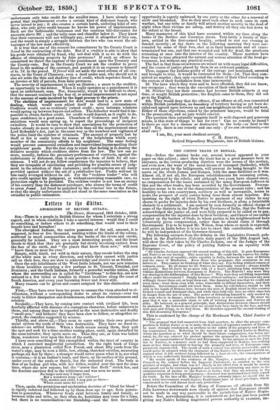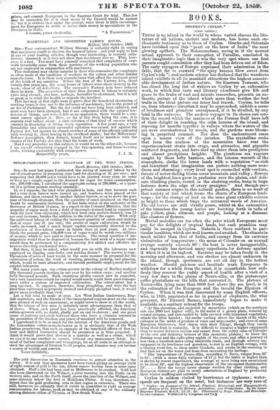THE COTTON TRADE IN BENGAL.
Sin—Before the mutiny broke out, several letters' appeared in your paper on this subject ; since then the trade has in a great measure been in abeyance, as the cotton-producing districts were the scenes of the mutiny, and even now, the want of the usual means of transport (bullocks), which were swept away by the belligerents, will prevent its being brought to the marts on the rivers Jumna and Ganges, with the same facilities as it was. Almost all, if not all, the European establishments for screening cotton, were destroyed by the rebels ; and although two years have elapsed since, no compensation for the losses sustained by the many European sufferers in this and the other trades, has been accorded by the Government. Procras- tination seems to be one of the characteristics of the present ruler ; and his hostility to his own countrymen, military as well as mercantile, seems to make the prospect of early justice being done them almost hopeless. His insisting on the right of every Native to payment of any claims he may choose to prefer for injuries done by his own brethren, is alone a formidable obstacle to a settlement. I am assured by men formerly in official charge of some of the districts in the North-West Provinces of India, that the Natives acknowledged the justice of, and were fully prepared to be called on to pay, compensation for the injuries done by their brethren; andI know of one indigo planter on the borders of Oude, to whom parties in his neighbourhood have voluntarily given compensation, rather than he should claim it through Government. It is to be hoped Mr. Wilson, from whom so much is expected, will arrive in India before it is too late to exact this contribution, and that he will be independent of the Governor-General. The following extracts from the debates in the Legislative Council, pub- lished in the Englishman (Calcutta daily paper) of the 29th August last, will show the view taken by Sir Charles Jackson, one of the Judges of the Supreme Court, of the policy of putting Natives on an equality with Europeans :—
" Sir Charles Jackson opposed tht second reading of this bill. It puts Europeans and Natives on one footing. This must not be. Ile could bluely repress hie indig- nation at the cant of equality, entire equality in India, between the men of Britain and the races of Hindostan. Even those who propagate this sentiment do not believe it. They cannot be thinking of what they say. It is feeling without reason or common sense. By all means let the Natives be paternally treated ; always kindly and justly. But let there be no more talk of a man's shrinking from drawing in- vidious distinctions between Europeans or Natives. The Natives why were they not sharing in the deliberations of this House ? Why were they not filling important offices under Government ? Simply because of their unfitness : not because any man willingly thrust them out, or kept them out. One damning fact was that we could not trust them : trust them even with anus, wherewith to defend themselves, and their families. Government could not trust them. Arms for self-defence should be left only in the hands of Britons here, because the men of English blood in this country formed a small and dominant class, and while they held rule here no other class was in danger from the use of arms. The power of defending himself is only needed by the man who is in danger, whether from treachery or over-numbers. Ile must re- peat that it was a miserable sham to talk of treating Europeans and Natives all alike. He believed, as a general principle, that distinctions between classes should be abolished. He believed also that we should look facts fairly in the face, and deal with men and things, as we find them. He therefore opposed the second reading of this Bill disarming Europeans."
This is confirmed by the charge of Sir Mordaunt Wells, Chief Justice of Madras:— The proposal that had emanated from high quarters, to alter the present com- position in Indian Juries so as to make them consist of a greater number of Natives, he most strongly condemned, as perilous to the safety of the property and lives of his countrymen here. Referring to the movement as regarded Juries in Madras, where the question as to what should be their future composition, was being agi- tated, he, for one, entered his protest against the proposal to form them, in every case, of an equal number of Natives and Europeans. In his opinion to open the Jury list to Natives, in a manner such as had been suggested in Madras, was nothing more or less than equivalent to leaving the property and lives of Europeans com- paratively unprotected. The result of such a course was plainly perceivable, and it could never be adopted while the character of the Natives for disregard of truth re- mained what it did, without being followed by a host of evils, the consequences of which it was sufficiently fearful even to contemplate. " He would speak of the evidence of Mr. Mangles, a member of the Indian Council on the subject before the Imperial Parliament, as entitled to the very greatest of weight, and what was it? clearly to the effect that it would be unwise and unsafe not to be extremely guarded and cautious in entrusting any share in the administration of justice to the Natives in India; that they are wanting in the qualities requisite to form good jurymen,—foremost was mentioned their little regard for truth. In the face of Mr. Mangles' evidence, solemnly taken, he should like to know what Government would deprive Englishmen here of those privileges, which constituted as he said almost their only protection."
Before the Committee of the House of Commons all officials from Sir John Lawrence downwards were clearly of opinion that Europeans should not be made in any way answerable to the jurisdiction of Native Magis- trates. But, notwithstanding, it is understood an Act has just been passed giving any Native holding magisterial powers authority to examine, ua- prison, and commit Europeans to the. Supreme Court for trial. This law may be rescinded, for it is clear many of the Council would be against it; but it is evident that under the present ruler there is little encourage- ment for Europeans to settle or invest their money in speoulations in the Provinces in India.



























 Previous page
Previous page